After winning The Match for Africa 3 against Andy Murray at sold-out Zürich Hallenstadion in March of 2018, Roger Federer takes time to address the press. In his characteristically unpretentious and easy going manner he fluidly responds in three languages to questions about family, tennis and the foundation. Andy Murray, standing nearby, also answers questions. “A good game for a good cause,” he smiles. It’s evident both players enjoyed the match which was a big success, collecting 1.4 million Swiss francs for the benefit of The Roger Federer Foundation.
The Roger Federer Foundation
Internationally televised, Roger`s friendly philanthropic duels started in 2010 with first guest-player Rafael Nadal, followed by a showdown with Stan Wawrinka in 2014. Donations to-date amount to six million Swiss francs.
Roger Federer started the foundation in 2003 when he was 22 years young and just beginning to rise in the world of tennis. What moved him to it?
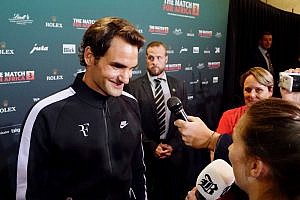 “I’m not sure, actually,” Federer says with disarming honesty into my microphone, then continues: “ but I was really interested in philanthropy. I saw other athletes doing it and thought what a wonderful way to give back. I remember Andrew Agassi once said that he ‘should have started so much earlier and why didn’t he’. I took that to heart. While still far from being an expert, I have more experience now and great people who advise me. My goal is to show my donors that I truly care about the projects, which I do. I talk about them, have these big fundraising matches, or work with major donors to come up with others` and my own money to put to good use in the foundation.”
“I’m not sure, actually,” Federer says with disarming honesty into my microphone, then continues: “ but I was really interested in philanthropy. I saw other athletes doing it and thought what a wonderful way to give back. I remember Andrew Agassi once said that he ‘should have started so much earlier and why didn’t he’. I took that to heart. While still far from being an expert, I have more experience now and great people who advise me. My goal is to show my donors that I truly care about the projects, which I do. I talk about them, have these big fundraising matches, or work with major donors to come up with others` and my own money to put to good use in the foundation.”
The work in Africa and Switzerland
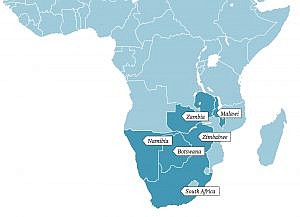 Philanthropic work in the world of sports isn’t new. The Roger Federer Foundation is a shining example. In thirteen years, the foundation has become a respected key player in the education of young children in the poorest regions of six nations in southern Africa. Continually fine-tuning strategies to support local communities to achieve self-sustaining projects, the philanthropic organization is close to target to benefit one million children!
Philanthropic work in the world of sports isn’t new. The Roger Federer Foundation is a shining example. In thirteen years, the foundation has become a respected key player in the education of young children in the poorest regions of six nations in southern Africa. Continually fine-tuning strategies to support local communities to achieve self-sustaining projects, the philanthropic organization is close to target to benefit one million children!
Dr. Janine Händel, CEO of the private foundation, elaborates: “Key to sustainable, long-term project success is the thorough situational and even wider regional context analysis up-front. It provides the reasons why and in what specific way the foundation can most effectively assist the community with the limited resources that we have available. Once we start the implementation phase through our local partners, we continue to monitor, analyze and fine-tune the programs.”
This approach includes twice-yearly personal visits to every project between the human rights specialist who has diplomatic service and previous foundation management experience, and her team of project managers.
Is it this hands-on approach, combined with a clearly defined needs analysis plus the use of synergies that make the foundation support so effective?
Foundation Board Member and Federer Manager Tony Godsick recently returned from his first project visits in Malawi and Simbabwe with the insight that “Some things one really needs to experience oneself!”
Dr. Händel agrees. “We believe in the power of Africa. During my regular visits I am continually astounded to witness what is possible!”
For example how African fathers start to get involved in their children’s education, or how older students’ voices are seriously taken into consideration in the decision making process by local school boards. These examples demonstrate a remarkable shift in attitude that has far reaching effects in accelerating education where there was minimal or none before.
From donor to partner-support organization
The Roger Federer Foundation made the transition from donor to partner-support organization on the pillar of project sustainability some years ago. Rather than a donor-beneficiary relationship, capacity is built through a catalogue of measures which among other criteria includes financial support, Dr. Händel explains.
In one example, the foundation’s study revealed that the twenty-five per cent grade one and two absenteeism was due to the children themselves perceiving schools as not child-friendly. With parents and schools not enforcing attendance, this would lead to predictable outcomes right at the onset of an educational process which should aim to equip students toward economical independence later in life.
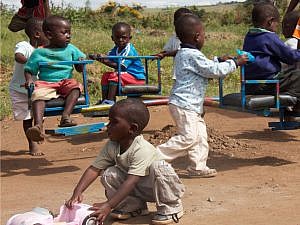 The foundation’s approach was to mobilize schools, parents, children and local partners to develop a comprehensive plan together: playgrounds, providing the most attractive class rooms for grades one and two (a major change in African thinking), school meals, improved pedagogy and didactic teaching methods, communication between schools and parents, and more. The foundation undertook the study, made recommendations, provided encouragement and financial support that could not be met otherwise and within one year, absenteeism had dropped sixty per cent!
The foundation’s approach was to mobilize schools, parents, children and local partners to develop a comprehensive plan together: playgrounds, providing the most attractive class rooms for grades one and two (a major change in African thinking), school meals, improved pedagogy and didactic teaching methods, communication between schools and parents, and more. The foundation undertook the study, made recommendations, provided encouragement and financial support that could not be met otherwise and within one year, absenteeism had dropped sixty per cent!
Africa must be improved by African Peoples
“We proceed on the conviction that Africa must be improved by the Africans. To us, this also means African organizations must implement the programs. Much of our work is dedicated to empowering and facilitating the growth of African organizations,” says Dr. Händel.
What touches and inspires the CEO is the incredible solidarity and dynamism of the people in these remote, poor areas. With conviction she adds: “It is the basis upon which we have and will continue to achieve remarkable results together.”
Dr. Händel traveled briefly to Zürich for The Match for Africa 3 before returning to Zimbabwe where she and her husband currently make their home with their two daughters, aged ten and eleven.
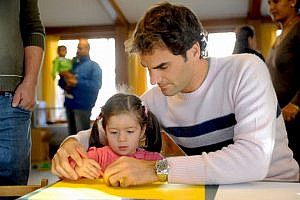 Around ten per cent of foundation revenue go to projects in Switzerland, where children from economically disadvantaged families are supported to attend extracurricular programs of their choice, such as sports, school support, music and cultural activities, youth camps and more.
Around ten per cent of foundation revenue go to projects in Switzerland, where children from economically disadvantaged families are supported to attend extracurricular programs of their choice, such as sports, school support, music and cultural activities, youth camps and more.
Future direction
While the first three matches took seven years to play out, the next – and first game outside Switzerland – is already scheduled in Seattle in just a few weeks. Supported by dedicated co-philantropist Bill Gates with a Youtube promise to fill the 16,000 seats Seattle stadium, Roger Federer plays John Isner.
The Zürich match with a balance of competitive and playful rallies, fun comment exchanges with Andy Murray, the ball girls & boys and spectators, and the entertainment during the breaks showed Roger Federer enjoying and dedicated to the many facets of the world he moves in.
With the Match for Africa to the benefit of the Roger Federer Foundation, the world’s most popular tennis player may have initiated a new form of social entrepreneurship between high-profile sports and the public. Other firsts may follow: Roger Federer’s dream destination to play a foundation match in South Africa may not be too far off in the future!
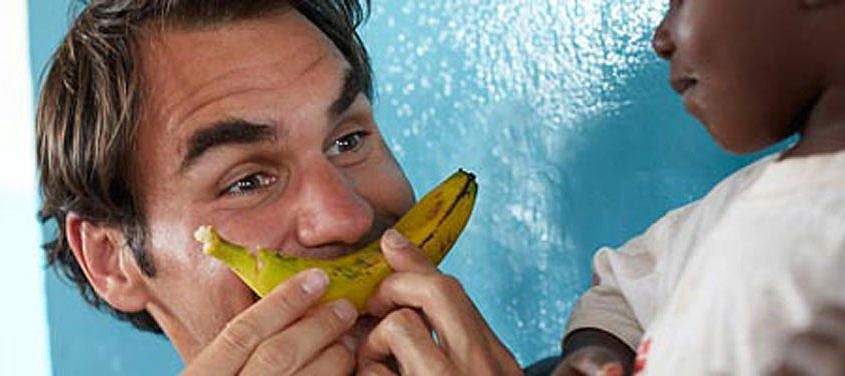
Were you aware of the Roger Federer Foundation? If you’d like to learn more, their website provides a detailed overview over many of their projects. Please share your thoughts if you’ve supported or been personally involved in a similar project and leave a comment below.
















I always enjoy your posts.
Thank you for your kind note, Kathleen. Happy to learn! – Silvia